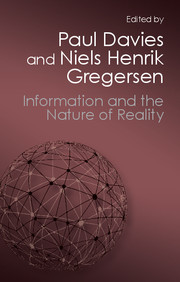Book contents
6 - Minds and values in the quantum universe
Published online by Cambridge University Press: 05 June 2014
Summary
Copenhagen is the perfect setting for our discussion of matter and information. We have been charged ‘to explore the current concept of matter from scientific, philosophical, and theological perspectives’. The essential foundation for this work is the output of the intense intellectual struggles that took place here in Copenhagen during the twenties, principally between Niels Bohr, Werner Heisenberg, and Wolfgang Pauli. Those struggles replaced the then-prevailing Newtonian idea of matter as ‘solid, massy, hard, impenetrable, moveable particles’ with a new concept that allowed, and in fact demanded, entry into the laws governing the motion of matter of the consequences of decisions made by human subjects. This change in the laws swept away the meaningless billiard-ball universe, and replaced it with a universe in which we human beings, by means of our intentional effort, can make a difference in how the ‘matter’ in our bodies behaves.
The role of mind in nature
Unfortunately, most of the prevailing descriptions of quantum theory tend to emphasize puzzles and paradoxes in a way that makes philosophers, theologians, and even non-physicist scientists leery of actually using in any deep way the profound changes in our understanding of human beings in nature wrought by the quantum revolution. Yet, properly presented, quantum mechanics is thoroughly in line with our deep human intuitions. It is the 300 years of indoctrination with basically false ideas about how nature works that now makes puzzling a process that is completely in line with normal human intuition. I therefore begin with a non-paradox-laden description of the quantum universe and the place of our minds within it.
- Type
- Chapter
- Information
- Information and the Nature of RealityFrom Physics to Metaphysics, pp. 134 - 154Publisher: Cambridge University PressPrint publication year: 2014
References
- 1
- Cited by

